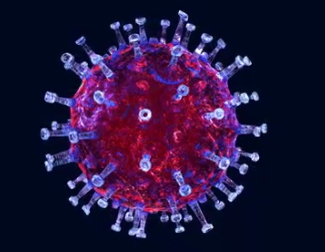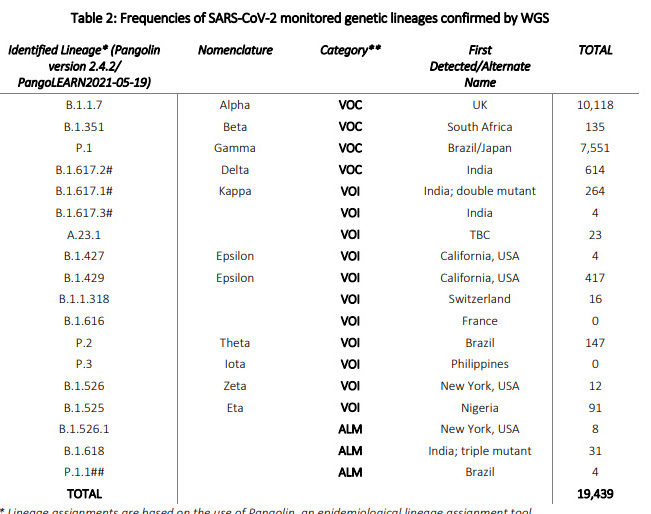Saturday June 12, 2021 | VICTORIA, BC
by Mary P Brooke, B.Sc., Editor | Island Social Trends
Whole genome sequencing is done on all COVID test-positive cases in BC. Provincial Health Officer Dr Bonnie Henry has made a point of emphasizing that in the last week or two.
The latest data about variants from the BC Centre for Disease Control (BC CDC) — covering the period May 30 through June 5– shows 57.4% of all COVID-19 cases have been caused by variants.
Of the 19,439 variant-caused cases in BC in that week, more than half (52%) were caused by the B.1.1.7 (UK/Alpha) variant, while 38.8% were caused by the P.1 (Brazil-Japan/Gamma) variant, and 3.15% were caused by the B.1.617.2 (India/Delta) variant.
There is also a less-widely discussed variant call B.1.429 (California/Epsilon) which caused 2.1% of cases in the May 30 to June 5 period.
The geographical location of where variations of the COVID-19 (SARS-CoV-2) virus indicate where the variant was first found among test-positive cases. It does show where people have travelled from and then come to (or returned to) Canada.
How the virus spreads:
Travel by people is how the virus spreads. And then there is transmission between people who ‘share air’. The virus is airborne. It enters the human body by way of the mouth, nose or eyes and other mucous membranes. This is why physical distancing is required between people during the pandemic.
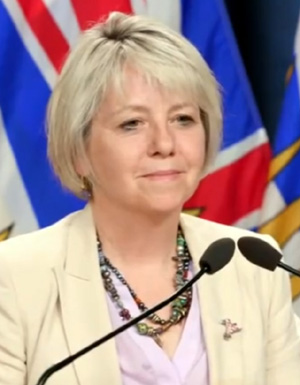
The COVID-19 virus can survive for short periods of time on surfaces; this is why people are encouraged to wash their hands frequently, to avoid bringing the virus from hand to face.
The B.1.617.2 (India/Delta) variant is presently considered to be more virulent, i.e. to transmit more easily and cause more serious illness.
Vaccination:
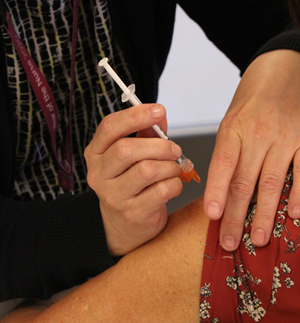
The currently available vaccines are considered effective against all current COVID-19 variants, as Dr Henry has said in recent weeks.
However, full vaccination requires two doses, in order to achieve greatest possible effectiveness of the protection provided by either mRNA (Pfizer-BioNTech and Moderna) or viral vector type (AstraZeneca) vaccines.
People in BC are encouraged to be registered for the COVID-19 vaccine and to book their appointments for first and second doses. There is a Get Vaccinated website for getting registered (registrants are then contacted by email or phone in order to book their appointment).
Appointment bookings are available based on the availability of vaccine supply, which in recent weeks has been ample. Both Dr Henry and Health Minister Adrian Dix are pleased about the incoming supply of vaccines (which are federally procured).
To date (June 11), there have been 3,893,581 COVID-19 vaccinations administered in BC, of which 497,932 (12.7%) have been second doses. On Vancouver Island, there have been 646,923 doses administered of which 71,236 (11%) have been second doses.
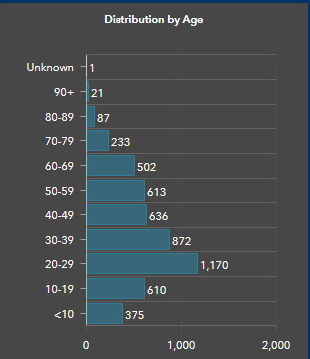
COVID is here to stay:
The goal of BC Health is to have 75% of the BC population vaccinated before what is called the fall respiratory season (from September through March each annual period) during which influenza and other respiratory diseases spread.
COVID-19 is now part of the respiratory season spectrum, until (if ever) the entire population of the world can be adequately vaccinated against the continually mutating virus.


